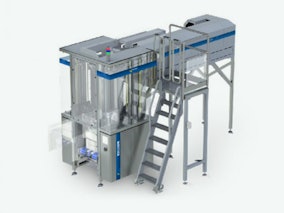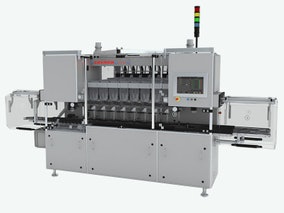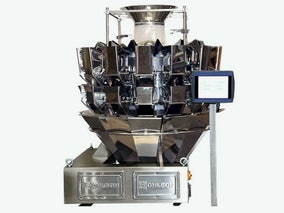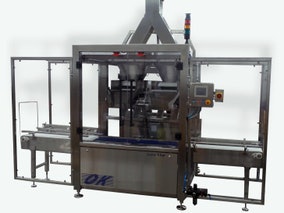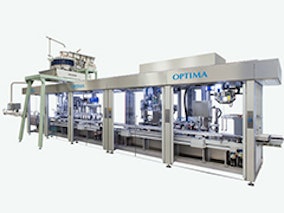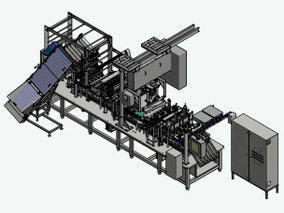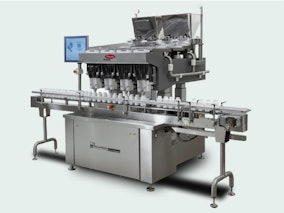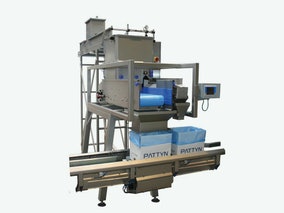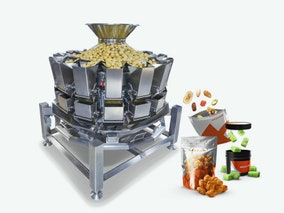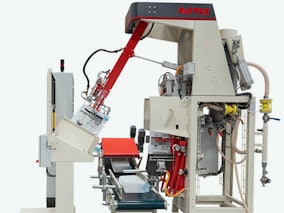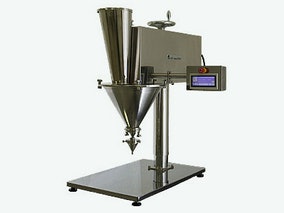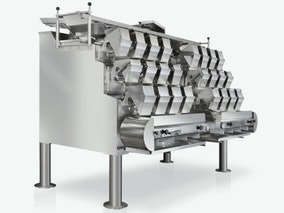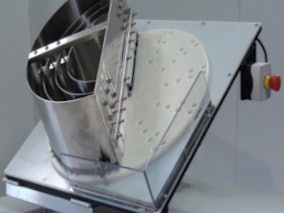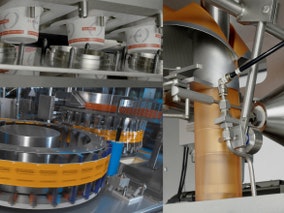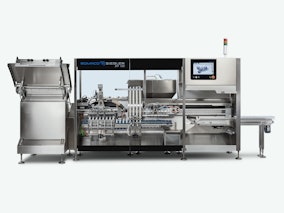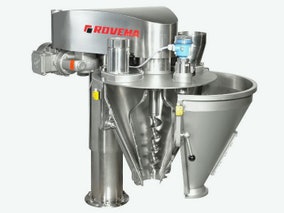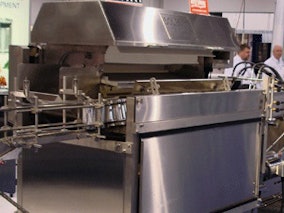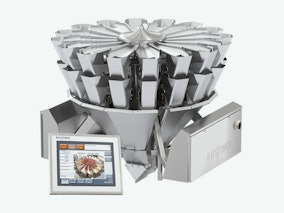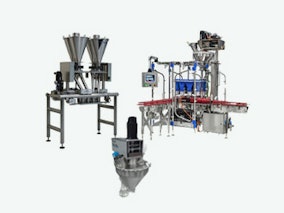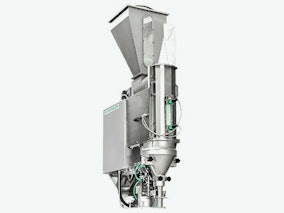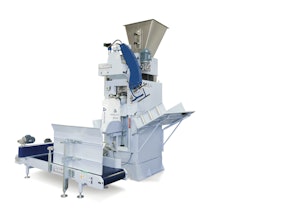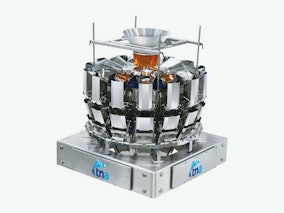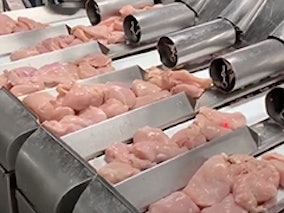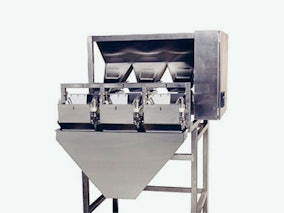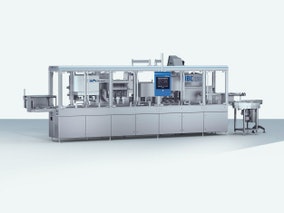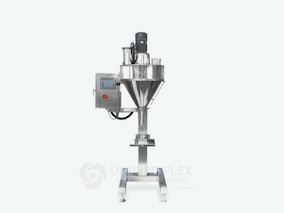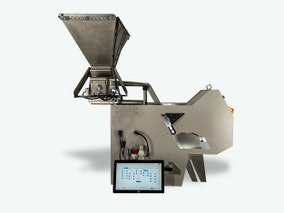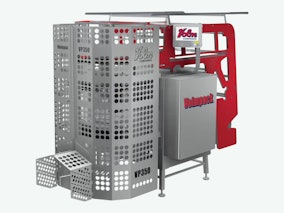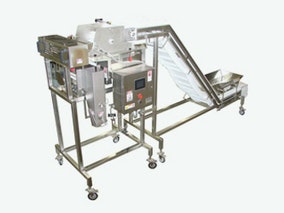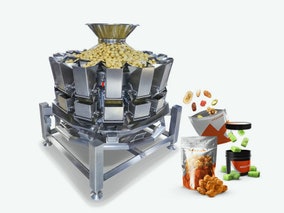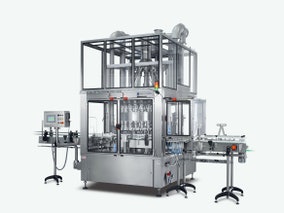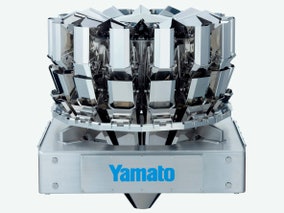Dry Fillers
(81 companies)Metering systems integrated into machines that deposit dry solid products (tablets, powder, etc.) into a variety of packaging formats. Find fully integrated rotary filling and inline filling systems by selecting “rotary” and “inline” filters at left. Are you considering purchasing new filling, capping or closing machinery? Learn more about what to look for in your next purchase.
Category Explained
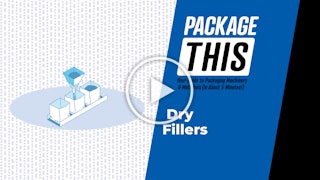
Dry Fillers Companies
-

ABM Equipment
As a systems design, build, and integration firm, ABM Equipment specializes in filling lines for dry bulk solids such as powders, granules, and other dry bulk materials. Featured products include their bulk bag fillers, which handle up to 3,000 pounds and feature modular designs with secure bag clamping, air venting, and optional certified scales for precise weight control. In addition, ABM Equipment's valve bag fillers use auger or pneumatic filling methods to deliver consistent fill rates and excellent dust control when working with valve-style bags. These systems are ideal for food-grade and industrial applications, providing clean, reliable performance and customizable features to meet specific packaging needs across a wide range of dry product types.
You are currently not logged in -

Accutek Packaging Equipment Co., Inc.
Accutek Packaging Equipment's auger filling machines are expertly designed for precise filling of dry products, powders, and granules. These fillers excel in efficiently handling dry products, especially at higher speeds. Coffee grounds, salt, pepper, sugar, and popcorn seeds are just a few examples of the products the auger filling machinery can flawlessly fill. The auger filling machines are specifically engineered to accommodate various types of rigid plastic, metal, and glass containers, ensuring versatility in packaging options. They are built upon heavy-duty stainless steel frames, guaranteeing durability and reliability. Furthermore, Accutek Packaging Equipment offers an automatic granular product weight filling machine that provides the option to order with either two filling channels, funneling into a single fill head, or four filling channels, funneled into two filling heads. This versatile configuration caters to diverse production needs and allows for efficient filling operations. Accutek Packaging Equipment's vibratory fillers present an ideal solution for dry granular products that demand precise weighing. This ensures accurate and reliable filling processes for granular products. With Accutek Packaging Equipment's auger filling machines and vibratory fillers, customers can trust in their exceptional performance and their ability to handle a wide range of dry products with utmost precision.
You are currently not logged in -

All-Fill, Inc.
All-Fill's auger filler is the foundation of the product line in which All-Fill's fine family of companies was established. All-Fill's semi-automatic auger fillers handle virtually any type of product; recent applications have ranged from protein powders, bakery sprinkles and ground coffee to pharmaceutical products, cosmetics and laundry beads. Typical models consist of a sturdy, cast aluminum head containing the drive components and a stainless steel column mounted on a rugged aluminum column. Controls include a variety of PLC-based packages, which can include a keypad or touchscreen operator interface. All-Fill's automatic auger fillers are designed for complete, continuous container transport, positioning, filling, and discharge to the next stage in the packaging process. An indexing system mounted on the conveyor regulates container movement toward the filling position, centers each container for filling, then moves the container away. Company offers options including fill-to-weight systems, multiple auger fillers, high-speed rotary systems and integrated auger solutions.
You are currently not logged in -

American-Newlong, Inc.
American-Newlong offers net weigh and gross weigh automated fillers for dry filling applications. The Newlong 3CM-PS single spout, a fully automated net weigh bag packaging system is American-Newlong’s most popular packaging option. An operator simply fills an empty bag magazine with approximately 200 bags and pushes the start button on the touch screen. This automatic bag filler, as with all American-Newlong automated bag packaging systems, maintains bag control throughout the entire packaging and bag closing process. This concept affords a high degree of successful filling and closing. The Newlong 3CM-5G automated gross weigh bag packaging system is specifically designed for powdery products. Utilizing a swing style bag feeder to place the bag directly at the fill chute, product is being weighed as it flows into the bag via load cells attached to the bag support mechanism. This automatic bagging machine provides a compact, low profile design with limited required head room.
You are currently not logged in
-

AMS Filling Systems, Inc.
AMS Filling Systems, Inc. supplies a range of filling equipment include volumetric cup fillers, auger fillers, net weight fillers and high-speed rotary filling equipment.
You are currently not logged in -

APPS Inc.
Electronic tablet counters from APPS are capable of counting all types of tablets, capsules and gelcaps, regardless of shape or size. Tablet counters are engineered for fast, easy changeover, without the use of tools. The unique design provides the operator with a clear, unobstructed view of the product, from hopper to bottle. This, coupled with a color-touch screen operator interface, and multi-language capability, creates an effective, user-friendly environment.
You are currently not logged in -

Ascend Packaging Systems, LLC
Ascend Packaging Systems supplies slat fillers for the pharmaceutical industry. The pharmaceutical industry requires an attention to detail and another level of compliance higher than most other markets. Preventing cross-contamination and running clean operation is vital to the end product, but it also adds time to the overall process. Bridging the gap between the goals of compliance and efficient operations in bottle-filling machines is the SureFill 300 Slat Filler, which is capable of throughput of up to 300 bottles per minute, providing the high productivity in bottle-filling applications. Slat filler features an open design that provides total access for easy cleaning, inspection, and changeover, as well as Allen Bradley PLC controls with open architecture for easy validation and support.
You are currently not logged in -

ATS Engineering Inc.
The ATS VP1x8-16 is a turntable filling, sealing and overcapping machine designed to fill round or rectangular containers with round or rectangular lids for products like nuts, candy and cookies. System heat seals pre-die cut foil or film from roll stock. Suited for small to medium scale production lines, this unit can run up to 40 containers per minute. Other filling systems include the ATS-BF pail filling machine, which handles volumetric filling for liquid, viscous or dry products. Features single-lane system for bulk filling rectangular and round containers up to 32 lb. Its heavy-duty frame is designed for long service life. Other features include automatic lid snap-on capabilities.
You are currently not logged in
-

Aylward Enterprises, LLC
Aylward makes both high-speed and low output solid dose tablet counters engineered for 100% count accuracy. ACT 9000 Series individually scans products and features fast throughput speeds, built-in dust/containment system, and a patented product counting; system is capable of quick changeovers and counts at high speeds -- up to 450 bpm. The TCM tablet counter features four product contact parts, tablet reject-on-the-fly, and patented product counting. Its camera inspection detects color discrepancies, chipped product and broken product.
You are currently not logged in -

Batching Systems, Inc.
Batchmaster® counters utilize patented dual view scanners to provide high accuracy counts possible. Out of tolerance parts are rejected prior to entering a package. The latest Batchmaster® IV counter is an accurate high-speed counting system that detects and rejects parts one-third smaller or larger than a target part thereby separating the good parts from the bad. These counters can easily integrate with upstream and downstream packaging equipment. Batching Systems can provide standalone counters or fully integrated turnkey packaging systems.
You are currently not logged in -

BellatRx Inc.
BellatRx makes solid dose product counting and handling equipment for products including pharmaceutical tablets, pouches or canister desiccants. Rx-12, a solid dose product count system, is a high-speed and flexible tablet and product counter that fits in a small footprint. The Rx-12 tablet counter is designed to provide improved count accuracy, requires no product change parts and features a tooless changeover in 15 minutes or less. BellatRx also manufactures powder filling equipment to cover any production rate and product characteristics.
You are currently not logged in -

BESSEN
Bessen offers a range of combination scales designed for a range of dry filling applications. Featured amongst Bessen’s six models of combination scales is the Smart Weigh 24 Head Mixing scale, designed to mix small granular products together into one package. Designed for small granular products such as seeds, tea, coffee, beans, corn and rice, the machine is used in high-speed mixing operations for single and multiple discharges. This model can mix two to four ingredients into one destination bag and features 24 hoppers to achieve high accuracy. Other models include the Smart Weigh 16 High Speed Scale for weighing small granular products with high discharge speeds with high accuracy even at speeds of up to 180 drops/min.
You are currently not logged in
-

BPI Equipment Inc
Multi-Head Weighers from BPI are capable of handling various product from fruit/nuts, candy, chips, powders and much more. Technical advantages of BPI's multi-head weighers include their high-grade 304 stainless steel construction, automatic frequency vibration control, a user friendly HMI color touch screen and easy removal of components with no tools required.
You are currently not logged in -

Bratney
Bratney supplies automatic bulk bag filling systems and semi-automatic tote filling systems for products such as feed, seed, processing agricultural industries and other dry product. Automatic bulk bag fillers can handle FIBCs with a range of sizes as well as seed boxes and other bulk containers. The Taylor System IBC 3000 Fillers are engineered for a variety of materials and containers. The IBC’s modular design allows complete flexibility from a free-standing manual operation to a fully integrated and automated system handling bags, drums, and boxes.
You are currently not logged in -

Brother USA Machinery LLC
The combined weighing and packaging machine is a combination of a multi-head scale and a vertical packaging machine, and the weighing and packaging integrated PLC program control. Fully automatic metering, filling and bag making, date of printing, packaging output, suitable for weighing tea, seeds, coffee beans, chocolate and other small particles. The combined weighing and packaging machine is affordable and has low maintenance costs. Maximum packing speed is 60 bags/min.
You are currently not logged in -

BW Flexible Systems
BW Flexible Systems supplies semi-free flowing and free-flowing bag filling equipment, as well as multi-head scale systems and computer combination weighers for dry filling operations. The Thiele OmniStar high-speed bag filling system for pet food, animal feed, food, industrial and agricultural products, offers production-enhancing features for large bags that were formerly found only on packaging systems for small bags. The OmniStar packages mid- to large-sized bags of product at speeds up to 20 bags/min. Thiele's 3110 Bag Filling System includes the improved Slidell PowderPacker Pro Vertical Auger Bagging System, a completely automated packaging system that offers virtually dust free bagging for most difficult to handle powders, especially titanium dioxide, resins and pigments, fine fluffy powders and powdered chemicals. BW Flexible Systems also offers a range of multi-head scale systems—including both Ishida and Yamato—delivering extremely accurate and fast weighing of a wide range of applications for all the industry sectors we serve, including IQF, produce, vegetables, confectionery, cheese, bakery, and more.
You are currently not logged in
-

BW Packaging
The BW Flexible Systems bag filling line features solutions for free and semi-free flowing products. Bag filling systems can handle a variety of products and accommodate a variety of bag types and sizes. Typical applications for Pneumatic Scale Angelus’ dry filling machines are either free-flowing powders and granules or non-free-flowing powders, creams, pastes and slurries.
You are currently not logged in -

CAM Packaging Systems
CAM Packaging Systems manufactures multiple weighing and filling systems based on individual requirements. Presented as a simple, low cost automation option for multihead weighing, system is designed to fill with high accuracy at high speeds. Weighing and filling line can integrate with CAM bagging lines and conveyor systems for greater productivity.
You are currently not logged in -

Capmatic Ltd.
Capmatic introduces an advanced monobloc system that streamlines the processes of filling, plugging, capping/crimping, and labeling stations. This innovation simplifies setup procedures and significantly reduces change-over time, ultimately enhancing overall operational efficiency. The Synergy Patriot, specifically engineered for high-speed performance, can operate at speeds of up to 60 bottles per minute. It boasts the versatility to handle various product consistencies, including liquids, powders, semi-viscous, and viscous substances. Furthermore, it offers the flexibility to insert plugs, dropper tips, or rubber stoppers, catering to a wide range of packaging needs.
You are currently not logged in -

Chantland MHS
Chantland MHS supplies a wide range of open mouth bag fillers, valve bag machines, and FIBC filling systems. Designed to simultaneously fill and weigh valve bags with dry bulk products, Chantland MHS's line of gravity, pneumatic, auger, impeller, and vibratory models utilizing balance scale beam and electronic load-cell technology to efficiently and accurately meter dry products such as fine powders, granular materials, chunks and pieces in a controllable, predictable fashion. FIBC fillers are designed to simultaneously fill and weigh bulk bags, gaylord boxes and drums with dry bulk products.
You are currently not logged in
-

Control GMC
The Model DM500 Weight Filler with Vibrating Conveyor is engineered to meet the diverse requirements of various industries. Utilizing advanced technologies, it delivers exceptional accuracy, speed, and reliability while accommodating various budgetary constraints. This machine handles fine powders, granular materials, and semi-solid products, ensuring product quality and consistency. Key features include precision weight control through a vibrating conveyor system, versatile application for a variety of dry products, high-speed operation filling up to 800 containers per hour, and a user-friendly interface for easy programming and operation. The Model DM500 Time-Driven Vibrating Filler offers adjustable fill times and utilizes vibration technology for even product distribution, handling up to 1,000 fill cycles per hour. It combines high efficiency and cost-effectiveness, reducing labor costs and minimizing product clumping, making it ideal for filling containers with powdered spices, flour, and other fine or free-flowing materials.
You are currently not logged in -

Cozzoli Machine Company
Cozzoli Machine Company supplies powder and tabletop filling machines for sterile powder filling applications. Featured machines include the PF Series powder fillers, which feature a dual-level supply hopper and agitator that provides just enough material of uniform density to supply the dosing chamber of each filling head. Powder filler can be equipped with 2-12 filling stations and is capable of reaching speeds of up to 300 containers per minute with high fill accuracy.
You are currently not logged in -

CVC Technologies
CVC supplies electronic tablet/capsule counters including the CVC1220 Hi Speed Electronic Channel Counter, designed for counting of tablets, capsules, and soft gels at high speeds. The machine comes standard with an automatic dust compensation system, dual vacuum ports, product count verification, and reject. In addition, CVC offers the CVC202 and CVC1000 Electronic Counters, economically designed for semi-automatic or fully automatic counting of tablets, soft gels, and capsules into bottles. The 202 Counter is designed for semi-automatic table top counting while the 1000 is an integrated machine including single or dual 202 heads mounted over an inline conveyor for fully automatic counting.
You are currently not logged in -

Dispac
The DISPAC powder filler is a machine equipped with multiple funnels and hoppers that can be separately and individually controlled to provide continuous filling for production lines. DIPSAC engineered this unit for versatility, so that it can quickly adapt to different types of containers, making it a reliable choice for various filling needs. With its low maintenance requirements and easy-to-change hoppers and spare parts, the DISPAC powder filler is marketed as a cost-effective solution for facilities. Furthermore, its agitator technology extends the machine's lifespan, ensuring long-term durability and efficient performance.
You are currently not logged in
-

Duravant
Duravant offers gross weigh, net weigh, and volumetric filling systems for fast and efficient semi-automatic bag filling of free-flowing granular products like seed, feed, grains, dry sand, salt and others. Combination scale systems for weighing/counting product and filling containers run at speeds reaching more than 200 cycles per minute with accuracies to within a fraction of a gram. Applications include confectionery, bakery, biscuit, cookie, cereals, fruit seed, snacks, chips, flake, nuts, pet food, detergent pods, hardware kit packaging, plastic parts, cosmetics, medical devices.
You are currently not logged in -

Elmar Industries, Inc.
Elmar Worldwide is an original equipment manufacturer of volumetric filling systems that dispense a variety of dry, free-flowing products such as beans, nuts, pet food, candy, popcorn and more. Each Elmar volumetric particulate filler is custom built to meet specific needs of customers and can include features such as individual station sliding gates, no-container/no-fill features, optional air bell and custom electronic control packages.
You are currently not logged in -

EQUITEK
The DSL series of fillers for powders and granular products from Equitek is a group of automatic packaging equipment that features robust linear architecture for the packaging of powdered or granulated products in rigid containers by means of an electronically controlled helical worm. The modular design of these devices allows them to be used in a wide range of products and presentations.
You are currently not logged in -

FEMC
From vegetables to candies, the FEMC Dial Filler is capable of dispensing any type of particulate with incredible accuracy. FEMC fillers maintain this level of accuracy with virtually no product distortion. Features on this machine include continuous or indexing motion, mobile casters for precise positioning, and plug and play integration. Adjustable volume settings help brands meet production needs.
You are currently not logged in
-

Fill-Tech Solutions Inc.
Fill-Tech's rotary fillers are engineered for value, versatility and durability. Capable of filling up to 3,000 cups per hour, the R-Series satisfies entry level, lab or other low output applications. With speeds of up to 9,600 cups per hour and advanced features included on large in-line machines, the R-Series is the flagship of the Fill-Tech rotary line. Handles screw type cups of 20-160 cpm. Works with servo-driven volumetric, servo driven augers, MID flow meter, time pressure and pocket fillers.
You are currently not logged in -

Grunwald Ltd
Grunwald offer a range of linear and rotary machines that can fill, seal and lid cups, bowls, tubs and pails with dry goods including potato chips, corn chips, nuts, extruded snacks in a range of packaging styles. Available with 1 to 10 lanes, Grunwald's dry fillers run at speeds from 2,500 to 50,000 cups per hour. Ultra clean options are available. Machines offer high flexibility due to mobile filling stations. According to Grunwald, there are no limits regarding product presentations. Machines also offer seamless format changeover without tools.
You are currently not logged in -

Grupo Empac SA de CV
Grupo Empac SA DE CV is a PMMI member that supplies dry filling systems that handle granules, powder that come in fill by weight, volumetric and auger system configurations.
You are currently not logged in -

Harpak-ULMA Packaging, LLC
Harpak-ULMA's G. Mondini dry filling systems operate volumetrically with both linear and rotary models available. These are used for dried grains, vegetables, frozen products, meatballs, and more. Harpak-ULMA multihead weighers from Cabinplant combine cutting-edge technology with user-friendly features to deliver unparalleled efficiency in weighing applications. Engineered for performance and precision, Harpak-ULMA food weighing systems support a near-limitless variety of products. Its flexible and reliable solutions offer customers accurate portioning, reduce waste, and streamlined production. Mondini also has a toppings doser to coat the top layer of a container with shredded cheese or other toppings.
You are currently not logged in
-

Haver & Boecker USA, Inc.
Haver & Boecker offer solutions for filling dry, bulk and powdery materials into bags of all types. Suppliers of valve bag filling machines, open mouth bagging machines, tubular form/fill/seal baggers and big bag fillers for the food and feed, cement, chemical, building materials and minerals industries, Haver & Boecker specializes in developing a new process flow for packing and designing complete turnkey projects. Company removes old equipment, prepares the area and installs the new equipment.
You are currently not logged in -

Heat and Control, Inc.
Ishida multihead weighers, available from Heat and Control, include the CCW-RV Series Multihead Weigher, which provides advanced weighing performance and accuracy along with water-resistant construction and sanitary design. Ishida CCW-RVE multihead weighers are a cost-effective mid-range solution that is pre-configured and integrates simple operator controls with advanced load cell technology.
You are currently not logged in -

High Tek USA
High Tek USA offers a variety of combination weighers. Its standard combination weigher features fully enclosed radial feeders and photo eye infeed detection and load cell, coming in 1-, 2.5-, and 5.5.-liter sizes. The premium combination weigher features dual opening springless hoppers and achieves speeds of 120 bags/min.
You are currently not logged in -

HUAPAQ
HUAPAQ is a distributor of PMR filling is an Italian company that has been manufacturing machines for filling, capping, and labeling rigid containers. A market leader in customized solutions, PMR offers everything from compact machines to complete production lines. Their expertise includes filling systems for creams, liquids, powders, beauty products, and even aggressive substances, ensuring flexibility and precision for diverse industries.
You are currently not logged in
-

Integrated Packaging Systems
Integrated Packaging Systems is an original equipment manufacturer of slat counters for solid dose tablets, capsules and soft gels. Slat counter’s “clean” design allows for low downtime for cleaning and changeover; it is virtually impossible for rogue tablets to hide. With a changeover time of 60 minutes or less, the Procount Slat Counter features a design with few parts, eliminating blind recesses that can hide tablets.
You are currently not logged in -

JBT Marel Corporation
JBT supplies versatile and hygienic units designed to fill a variety of powdered goods. Applications range from baby formula, coffee and chocolate powder to spices, cosmetics, nutraceuticals and everyday household cleaners. Powder and granular product fillers accommodate many styles of rigid and semi-rigid packaging, from steel and composite cans to jars and bottles. Powder filling machines use the most appropriate filling method – vacuum, volume, time, or an optimal mix of these. JBT also assists customers with related needs to a dry filling line such as scoop placing, in-line gassing, seaming, inspecting and barcode labeling.
You are currently not logged in -

MACTEC Packaging Technologies
Mactec Packaging makes monobloc fillers for filling dry products such as K-cups for coffee. The rotary MTMB60 monobloc is designed for larger product applications, with a set-up for four cups per index. Featuring a vertical magazine type manual cup load, this machine can fill liquid or dry products and includes a filter forming and insertion station with powdered unwind units. Presence sensors are included for all functions. Other features include a nitrogen flushing enclosure to obtain 5-10% residual oxygen level and automated lid placement and sealing stations.
You are currently not logged in -

Magnum Systems, Inc.
Taylor brand IBC bulk bag fillers are engineered for a variety of materials and containers. The modular design allows complete flexibility from a free standing manual operation to a fully integrated and automated system handling bags, drums, and boxes. IBC bulk bag fillers come standard with standalone frame or complete automated system and a 12-in. diameter inflatable neck seal to provide dust tight seal; handle up to 3,000 lb capacity.
You are currently not logged in
-

Marchesini Group USA Inc.
Marchesini Group USA offers a range of tablet and capsule counting equipment, including machines designed to handle tablets, operculated or soft-gel capsules. Machines are available as "counter-only” and “monobloc” versions with an integrated capping system. Marchesini Group also manufactures filling and capping machines for effervescent tablets in rigid tubes. These machines feature an innovative positive loading system comprised of a 12-arm pick-and-place robot that collects the tablets in rows, rotates them 90° and gently inserts them in the tube, according to the required stacking. The presence of on-board sensors to check correct stacking and control systems to verify correct cap application, ensures extremely high quality filling and capping operations for individual tubes.
You are currently not logged in -

MULTI-FILL, Inc.
The MPF fillers deposit products such as: cooked pasta (short & long goods), cooked or IQF rice, cut fruits and vegetables, refrigerated salads, and others, into many types of containers (trays, plates, cups, bowls, cans, bags, jars, etc.) at speeds up to 120 containers per minute.
You are currently not logged in -

MULTIPOND America Inc.
Multipond American offers multihead weighers and combination scales made in Germany.
You are currently not logged in -

Nalbach Engineering Co., Inc.
Nalbach’s powder filling equipment includes a line of volumetric filling machines covering the range from low-speed indexing to multiple-head, continuous motion, rotary high-speed systems. Capabilities include automatic fill weight control and an option for 3-A dairy applications. Line of auger fillers for low, moderate, and high-speed applications are all servo-driven with touchscreen controls. Nalbach also offers an innovative modified atmosphere packaging system (MAPS) system for the food and beverage industry that is capable of reducing the residual oxygen (RO2) level to less than 1%, depending on the application.
You are currently not logged in
-

National Bulk Equipment, Inc.
National Bulk Equipment bulk material filling systems -- including bulk bag fillers, bulk container fillers and drum fillers -- enable packaging and processing operations to run production at designed speeds without concern for recurring material waste, rework, or excess labor allocation common with under-performing bulk material filling systems.
You are currently not logged in -

Niverplast NA Inc.
Niverplast is a supplier of a range of dry filling equipment used for bulk filling applications for food service and related applications, as well as powder filling systems for large bags. The Box Loader will gently place full and half baguettes as well as small potatoes into lined boxes at speeds of up to 10 boxes/min. The Linear Weigh Filler handles a wide variety of sizes of cases, for bulk filling applications of grains, dried fruit, nuts, candy, frozen fruit, and other dry solid foods. The PowderFiller fills powder products up to 2000 kg/hour into a range of lined cases with a high filling accuracy; options to fill big bags are available.
You are currently not logged in -

NJM Packaging
NJM is the representative of Cremer tablet counters in North America. Tablet Counters from Cremer feature a robust construction and are designed for quality and accuracy in pharmaceutical and nutraceutical applications. Product line includes standby workhorses such as the CF-1220 and the servo-controlled precision of the CF-622. Each Cremer tablet counter can be taken apart for easy cleaning without tools.
You are currently not logged in -

nVenia, a Duravant Company
nVenia, a Durant Company, offers Hamer Brand gross weigh, net weigh, and volumetric filling systems for fast, accurate and efficient semi-automatic bag filling of free-flowing dry granular products like seed, feed, grains, dry sand, salt, and others. Ohlson brand’s combination scale systems for weighing/counting product and filling containers with speeds is capable of reaching more than 200 cycles per minute and features accuracy to a fraction of a gram with applications in confectionary, bakery, biscuit, cookie, cereals, fruit seed, snacks, chips, flake, nut, pet food, detergent pods, hardware kit packaging, plastic parts, cosmetics, medical devices, with virtually any weight or shape.
You are currently not logged in
-

OK International Corp.
OKI designs a wide range of stainless steel automatic weigh fillers that can be customized to the needs of the application. These machines are manufactured for a variety of dry solid products or for semi-liquid oils and fats such as margarine and shortening. Fillers are usually combined with case erectors, bag inserters, bag closers, case sealers and ancillary equipment to create automatic polybag-in-box systems.
You are currently not logged in -

OPTIMA Machinery USA Corporation
As portion packaging for coffee, tea and other food items experiences steadily increasing demand, Optima Consumer provides dry filling machines specially designed for the flexible and efficient manufacturing of small packaging sizes. The special features of the coffee and tea types as well as their typical types of packaging are taken into individual consideration in the modular design of the filling and packaging machine. High outputs with the best weight accuracy can be achieved using the combination of dosing technology and downstream checkweighers.
You are currently not logged in -

Packline USA
Company's product line includes dry fillers for filling coffee (KCups), cereal, rice, beans, protein and spices into a rigid container or pouch.
You are currently not logged in -

PallayPack Inc
PallayPack is an original equipment manufacturer of machines designed for electronic counting of gummies, hard gelatin capsules, soft gels, tablets, round pills, hard candies and a wide range of other solid products. Range of machines includes multipack counter/sachet systems, tablet counter/vision system, dual lane counters, seed counters, low-volume electronic counters, vitamin counters and more.
You are currently not logged in
-

Pattyn, A Duravant Company
Pattyn North America supplies dry filling equipment for applications ranging from linear fillers for bulk solids to weigh fillers for tobacco. Featured fillers include the LBVF‑34A linear belt vibratory weigh filler, which combines belt and vibratory dosing on one machine for applications such as weighing and filling solid chocolate. The LVF-14A/B-D linear vibratory filler comes with one or two heads, designed for fragile products up to 30 x 30 x 30 mm, such as nuts, diced and sliced IQF fruits and vegetables and small granular products.
You are currently not logged in -

Paxiom Automation, Inc.
Paxiom Group offers a wide array of weigh filling machines for almost every production need, accuracy requirement, space constraint and budget. The Primo™ family of automatic weigh filling machines, designed to ensure ease of use, sanitation and serviceability, includes the PrimoCombi™ multi-head weigher family of automatic combination scales; the PrimoLinear™ automatic net weigh filling machine for filling a wide range of products into bags, cartons, trays, boxes, jars and containers; the PrimoLinear C-series for weigh filling applications that require a conveyor to successfully transfer sticky products into the weigh bucket; and the PrimoLinear V and T Series of bulk weigh filling machines are designed to weigh and fill both cases and totes. For handling powders and granules, Paxiom supplies the servo-driven Star Auger automatic filling machine which offers precision, speed and versatility. Other dry fillers from Paxiom Group include the pocket depositor, designed to eliminate hand labor by automatically filling multiple product fill zones; it can be easily integrated with automatic thermoforming machinery and tray indexing conveyors.
You are currently not logged in -

PAYPER America Central SA de CV
PAYPER is one of the leading manufacturers of complete bagging lines. PAYPER has been developing high-performance bagging equipment for more than 50 years and can satisfy the demands of any required production capacity: from a low to a high degree of automation. With PAYPER’s technology, powdery and finely granulated products can easily be bagged in any kind of bag: valve, open-mouth, form/fill/seal and industrial sacks (big bags).
You are currently not logged in -

Per-Fil Industries, Inc.
PER-FIL® Industries auger filling machines are designed for powder, pastes, or granular filling applications. Originally developed for the toner industry, its patented technology fills products for the pharmaceutical, nutraceutical and other industries, for difficult to fill powder products and other complex projects. Designed for speed, cleanliness, and precise fills, these auger fillers are 100% made in the USA and built to last.
You are currently not logged in
-

PFM Packaging Machinery Corp.
The range of multihead weighers machines from PFM is specifically designed to meet any need of flexible packaging for food and non-food applications. Multihead weighing systems range from the MBP Series C1, an entry-level budget combination multi-head weigher to the new range of Series C4 multihead weighers, designed for high -speed precision weighing of fragile and delicate products. The MBP Series C5 range of multi-head linear weighers is designed for sticky products and other goods that are difficult to handle.
You are currently not logged in -

Pharmapack North America
Pharmpack North America supplies counters for the pharmaceutical industry, including the PP-03 automatic machine, capable of counting 3,000 pieces/min. The PP-05 automatic machine counts up to 5,000 pieces/min. Pharmapack North America's PP-06 automatic counting machine runs at speeds of up to 6,000 pieces/min.
You are currently not logged in -

Phoenix Engineering
Phoenix Engineering makes machines that count and feed vitamin type round tablets, oblong tablets, two-piece capsules and large fish oil type gelatin capsules and similar type products. The MD4-24 product counter is designed to count and fill four different types of products with single or multiple counts of each type product. When dispensing the products into a single pouch the production rate is 45 to 50 bags, pouches per minute. With some products the MD4-24 can fill 2 different products into two side by side pouches (2 pouches, bags per cycle) and then achieve a total throughput of 80 bags per minute.
You are currently not logged in -

Plan IT Packaging Systems Inc.
Plan It Packaging provides an extensive selection of weigh filling machines to accommodate various production needs, accuracy requirements, space limitations, and budgets. The EliteWeigh family of automatic weigh filling machines is designed for user-friendliness, sanitation, and easy maintenance. This family includes multi-head weighers, automatic net weigh filling machines suitable for filling a wide range of products into bags, cartons, trays, boxes, jars, and containers, machines designed for weigh filling applications that necessitate a conveyor to effectively transfer sticky products into the weigh bucket, and bulk weigh filling machines engineered to weigh and fill both cases and totes.For handling powders and granules, Plan It Packaging offers a servo-driven automatic filling machine, which boasts precision, speed, and versatility. This machine can be seamlessly integrated with automatic thermoforming machinery and tray indexing conveyors.
You are currently not logged in
-

R.A Jones
R.A Jones equipment can primary package dry products into pouches, cups, tubs, and trays. For pouches, Pouch King equipment can package various powdered products like drink, baking, and spice mixes, as well as pharmaceutical and nutraceutical nutritional powders, oatmeal, grains, sugar, small candies, and more. Machines can run up to 2,000 ppm. Cup filling equipment from R.A Jones can run up to 840 cups per minute. Company has experience running various dry products like coffee, tea, cookies, snacks, nuts, cereals, instant foods, stuffing, and more.
You are currently not logged in -

Romaco Group
Romaco Siebler is a leading international supplier of strip and rigid tube packaging machines used in for pharmaceuticals, nutraceuticals, medical products and drugstore items. Featured machines include the STF 120 rigid tube packaging machine for effervescent tablets. Features reduced changeover time due to very few format parts, advanced level of automation for total process control and safe product handling features to avoid breaking soft effervescent tablets.
You are currently not logged in -

ROVEMA North America, Inc.
ROVEMA auger fillers can be fully integrated into vf/f/s operations. Volumetric fillers come standard with several features that allow for ease of cleaning and monitoring, like a split door hopper that offers high accessibility and a hopper window so that the fill level can be monitored. Augers can also be equipped with the company's patented gas-flushing technology Aroma Perm, used in the coffee and powdered baby food industries and allows customers to get under 1% residual oxygen in their final packages of sensitive products.
You are currently not logged in -

Solbern Inc.
Solbern Direct Fillers are available in over 12 different models. Fillers are capable of handling a wide range of products, such as vegetables, fruits, spices, snacks, grains and delicate products. The Direct Filling technique uses the container as a measuring device for precise filling. Highlighted in the Solbern product line is Model 301 Filler, a straight line type open style machine capable of precise filling at speeds of up to 500 containers per minute, depending on product and container size. PTF Direct Fillers are designed to fill whole, sliced, diced and chunky products, even if they are not free flowing. They fill cans or jars completely or partially full, to the exact weight required.
You are currently not logged in
-

Sourcelink Solutions, LLC
SourceLink is a distributor of Bilwinco weighing and filling systems, offering a full range of combination weigh scales, innovative product infeed systems, and product discharge tooling to meet a wide range of packaging applications. Bilwinco products include multihead scales as well as specialized weigh scales for food processing and non-food industrial applications.
You are currently not logged in -

Spee-Dee Packaging Machinery, Inc.
Spee-Dee Packaging Machinery offers a variety of systems for all dry fill applications. Choose auger fillers for applications ranging from hand filling of containers to high-speed, high-torque applications. Auger fillers easily integrate with automatic equipment like vertical baggers, horizontal pouch machines, cartoners and conveyor lines. High-speed rotary filling systems for rigid containers enable hygienic operation with the ability to easily run multiple SKUs. Patented magnetic funnels eliminate fasteners and attach to the turret using embedded magnets to make the filler more hygienic and quicker to changeover. Volumetric cup fillers allow for fast cup size changeovers, with a simple drive system and minimal number of parts, making a durable, low-maintenance option. They are designed to handle various applications, from simple hand-fills to interfacing with automatic equipment, reaching speeds of up to 140 fills per minute.
You are currently not logged in -

Syntegon Packaging Technology
Syntegon offers a vast range of filling machines for powder, granule and other dry filling applications, including the FVS auger filler series, specially designed for the volumetric filling of a wide range of free-flowing products. Part of this series are four specific auger fillers that ensure very high dosing accuracy for both very small and big batches. The fillers’ solid design allows CPG customers to easily handle the equipment and carry out quick format changes. The machine can be easily integrated with Syntegon checkweighers such as the KWE/KWI 6000 with an integrated tendency regulation. The auger filler is also available with hygienic features for sensitive products.
You are currently not logged in -

TDI Packsys LLC
TDI Packsys offers a number of scale and dosing options to cover filling of a range of dry product types. Multi-head combination weighers are available from 10 head up to 32 head systems, with extensive options including dimpled surface, breakage proof, leak proof. Highly customizable for specific products and applications, these combination scales feature remote touchscreen HMI for easy and convenient control and an IP65 washdown rated. Other products include linear scales for powders, granules, vegetables and fruit; servo-auger fillers for fine powders and granules, such as powders, spices and seasonings; and counting systems with digital vibratory systems for high capacity applications.
You are currently not logged in
-

Technipes USA / Cordano Packaging
Technipes USA provides solutions for precise and efficient bagging of dry goods, offering open-mouth bag fillers capable of handling bags ranging from 10 to 110 pounds with output rates up to 1,200 bags per hour. These systems are compatible with a wide range of open-mouth bag types and include features like net-weigh scales for accurate weight control, dust collection for cleaner operations, and optional product densification. Additionally, valve bag fillers accommodate bags from 20 to 110 pounds with speeds reaching 1,400 bags per hour. These fillers enhance cleanliness and seal reliability by incorporating ultrasonic sealing technology, which reduces spillage and ensures secure closures for various materials.
You are currently not logged in -

TNA North America, Inc.
Simplify weighing processes for both wet and dry applications with the tna intelli-weigh® omega series. With a stainless-steel construction and waterproof scales, these efficient multi-head weighers offer an advanced hygienic design that goes beyond industry standards to ensure seamless maintenance and quick product changeovers. The series is eco-friendly too, helping to reduce product waste, while its simple structure requires fewer parts that need changing due to wear and tear. In addition, a modular actuator unit provides quick troubleshooting when needed.
You are currently not logged in -

Triangle Package Machinery Co.
Triangle Package Machinery’s family of inline combination weighers is designed for accuracy and speed. System provides even product distribution, leading to fewer missed cycles compared to traditional circular multihead weighers. In addition, Triangle’s inline weighers mount directly on top of vertical form/fill/seal (VFFS) baggers, saving valuable floor space and eliminating the need for costly mezzanines. Markets include: cereal, fruits and vegetables, pet food, snacks, nuts, candy, meat, poultry and seafood.
You are currently not logged in -

Tridyne Process Systems, Inc.
Tridyne specializes in the custom design of automatic bulk filling machines and net weigh fillers for bagging dry products, including a broad range of vibratory feeders, weigh counters and automatic counters and custom systems. Featured net weigh fillers include the F-206 Super-X series, which comes in six different configurations and is used in large scale operations to weigh product into boxes, pails, bags, or bins.
You are currently not logged in
-

Uhlmann Packaging Systems L.P.
Uhlmann offers pharmaceutically compliant bottle lines, including the IBC 150 for the packaging of tablets and capsules in bottles. The integrated monobloc architecture of the IBC 150 offers all the essential stations for the packaging of tablets in bottles. This line is highly automated, optimally linked, centrally controlled, and completely flexible. The basic model includes stations such as the bottle infeed, servo-regulated tablet counter, capping unit, and bottle discharge. Other elements, like a modular desiccant feeder for canisters or sachets, a weighing system, a camera system for tablet inspection, or a cotton wad feeder, can be integrated as required.
You are currently not logged in -

Unified Flex Packaging Technologies
The AF-100 Auger Filler is a versatile, low-cost, semi-automatic auger filler equipment for consistent materials in powder form. This volumetric filling machine is also used with Unified Flex's VertoBagger Series bagging machines. It features a direct-driven servo motor for those applications that demand speed and accuracy. Independent agitation blade keeps the product in same consistency as its processed through the filler. The precision of the AF-100 Auger Filler’s stopping position and the ability to key in motor acceleration, deceleration, rotational speed and the exact number of revolutions via the touch-screen control panel are among the highlighted features.
You are currently not logged in -

VMek Sorting Technology
VMek is a supplier of size sorters, count/batch inspection, color sorters, and high-speed counters that are integrated into agricultural filling lines for grains, seeds, corn and other food products. Robust machines are specifically designed to integrate with horizontal and vertical form/fill/seal operations as well as pre-made pouching machines and rigid container handling systems for the packaging industry.
You are currently not logged in -

Volm Companies, Inc.
The Volmpack Single Wicket Bagger (WB) is designed to pack potatoes, fruits, onions, citrus, avocados and other dried foods. This popular bagger is built to pack into pre-made, wicketed bags. Machine is capable of filling bags at rates up to 32 bags/min.
You are currently not logged in
-

Weigh Right Automatic Scale Co.
Weigh Right Automatic Scale specializes in net weighers, direct fill gross weighers, piece count scales and volumetric fillers, ranging from low-cost, entry level scales to vibratory and bulk fill scales. Featured scales from Weigh Right’s comprehensive line include the iQ-1E entry-level scale, used in the coffee industry, snacks, candies, petfood, popcorn, granola and similar products. Other machine categories include Weigh Right’s line of vibratory, linear net weight scales using 1 to 6 lanes for applications such as filling dry or IQF foods, plastic parts, snacks, candies and more. Weigh Right also supplies direct fill scales for bag-in-box case applications, fresh-cut vegetable scales, and the BDC Series of scales for slightly moist products such as cut cooked potatoes and diced tomatoes.
You are currently not logged in -

WeighPack Systems, Inc. / Paxiom
WeighPack Systems offers a wide array of weigh filling machines for almost every production need, accuracy requirement, space constraint and budget. The Primo™ family of automatic weigh filling machines, designed to ensure ease of use, sanitation and serviceability, includes the PrimoCombi™ multi-head weigher family of automatic combination scales; the PrimoLinear™ automatic net weigh filling machine for filling a wide range of products into bags, cartons, trays, boxes, jars and containers; the PrimoLinear C-series for weigh filling applications that require a conveyor to successfully transfer sticky products into the weigh bucket; and the PrimoLinear V and T Series of bulk weigh filling machines are designed to weigh and fill both cases and totes. For handling powders and granules, WeighPack supplies the servo-driven Star Auger automatic filling machine which offers precision, speed and versatility. Other dry fillers include the pocket depositor, designed to eliminate hand labor by automatically filling multiple product fill zones; it can be easily integrated with automatic thermoforming machinery and tray indexing conveyors.
You are currently not logged in -

WEIGHTPACK, Inc.
WeightPack's net weight dry fillers are the ultimate solution for effortless packaging of sugar, nutraceuticals, and other dry products. Fillers ensure accurate measurements every single time, leaving no room for error and preserving the product's qualities and freshness.
You are currently not logged in -

Yamato Corporation
Yamato Dataweigh® combination scales are designed to deliver high accuracy and high speed to increase productivity and the bottom line. Yamato scales can weigh products that are dry and free-flowing, wet and sticky, or frozen and difficult to run. Yamato also offers semi-automatic combination scales, ideal for fragile products that can’t withstand the height drop normally associated with an automatic radial combination scale.
You are currently not logged in
Report an Issue
Incorrect/inaccurate categorization? Report inaccuracies or problems »
Related Filling, Capping & Closing searches
More on Dry Fillers
A dry goods filling machine is used to dispense products like tablets, nuts, screws, powders, and granules in predetermined, measured amounts into bags, cartons and other packaging formats. By more accurately and expediently filling containers with these materials, dry product fillers can dramatically reduce manufacturing costs and downtime, which naturally leads to a better looking bottom line.
There are several advantages that a dry filling system holds over manual loading and alternative solutions. Using these machines certainly reduces labor costs, as only one operator is needed to feed and manage the packaging material. Additionally, unlike manual filling methods, automatic dry fillers are able to consistently fill at precise levels, which improves product integrity in a steady state. Lastly, dry fillers offer a large degree of flexibility in regards to the materials they’re able to work with; even those that are lightweight, abrasive, corrosive, or easily damaged can be utilized. This allows for a litany of different manufacturing or packaging use cases.
What's more, in recent years, several advances have been made in dry filler technology. Bolstered by years of improvements in computing, modern fillers feature sophisticated sensors that measure product flow and detect when containers are almost at capacity. This allows for precise, quick filling, rendering the need for manual intervention almost negligible. Furthermore, some filling systems are able to integrate and synchronize with material handling systems, allowing for automatic container discharge. The benefits of this integration are quite obvious to anybody in the industry.
There are a few specific types of fillers worth elaborating on. Net weight fillers, also called net weighers, are used in dry filling applications. These machines use load cells beneath each filling station to dispense dry products by exact tare weight. Auger fillers use a rotating screw to dispense products through a tube for even, volumetric distribution, such as powdered milk or granulated sugar. Piece counters are designed to dispense parts or pieces to precise specifications, such as a 50-count screw bag or box. Tablet counters, which are often used in pharmaceutical and nutraceutical packaging operations, dispense a set quantity of tablets into a container. Slat counters are also part of this family of products.
Combination scales, also known as combination weighers and weigh scalers, are another widely used equipment in dry filling. These machines use multiple weighing heads to combine the total product weight in each head to determine that a specified weight has been reached before discharging to a container, such as on a potato chip bag line.
Vibratory fillers are equipment that vibrates to dispense small, dry or granular items. Multiple lanes distribute products from a bulk hopper to a container to reach a specific weight or count, such as in peanut packaging applications. Pocket fillers, also known as cup fillers, are volumetric fillers that dispense dry products such as cat treats or nuts by moving products from a hopper to a defined-size chamber that drops products during filling.
Loss-in-weight filler systems measure how much product has been dispensed by detecting the reduction in weight of a scale-mounted hopper as product exits the hopper.
With so many options and benefits, dry filling technology continues to grow in providing reliable solutions for manufacturers looking to improve their production or packaging lines. Reducing labor costs and production times, while ensuring accuracy and product quality, make dry fillers a clear cut winner that businesses can rely on to remain competitive in a rapidly changing industrial landscape.
Find the investment-worthy dry filling machine your company needs today. Browse PMMI’s ProSource directory of vetted and verified machinery manufacturers.
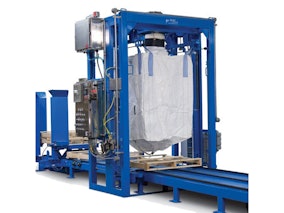
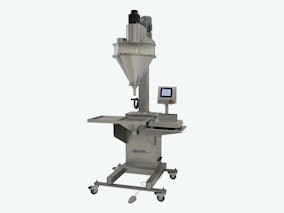
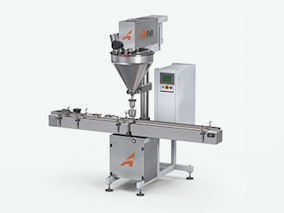
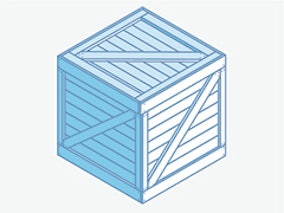
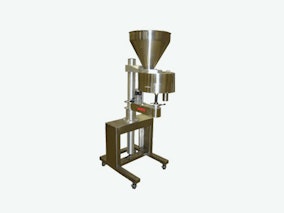
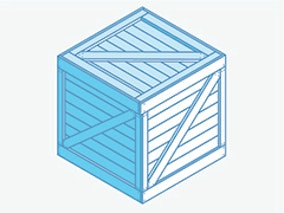
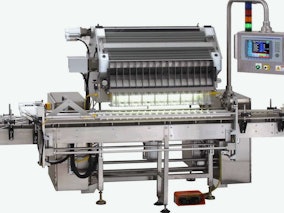
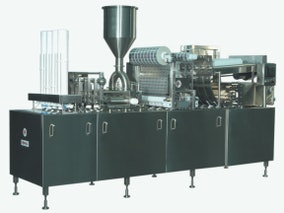

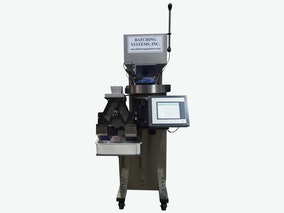
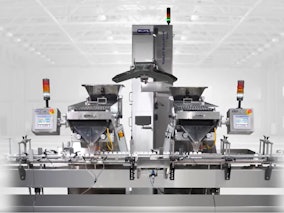
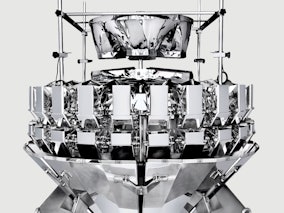
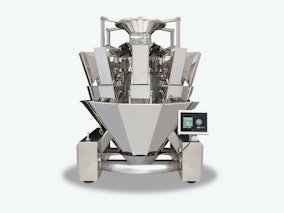
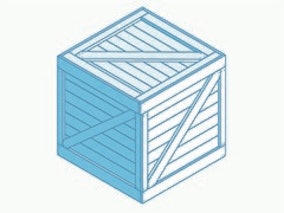
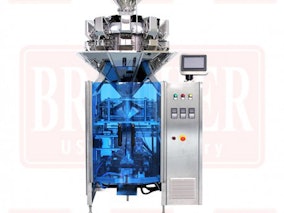
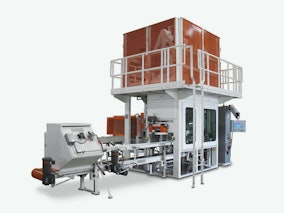
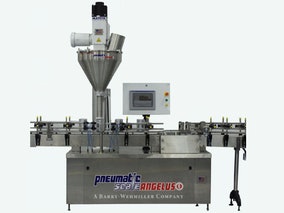
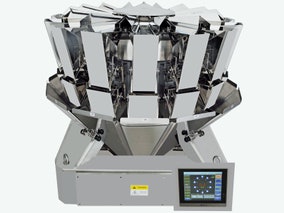
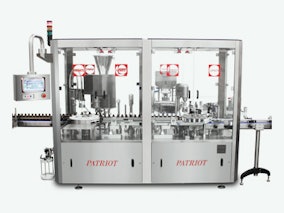
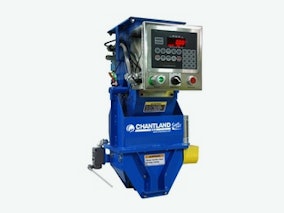
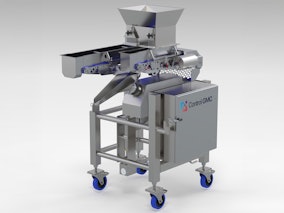
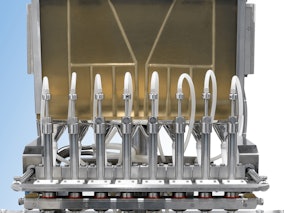
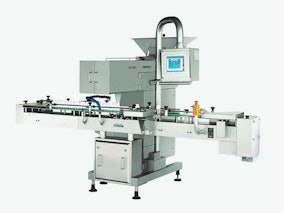
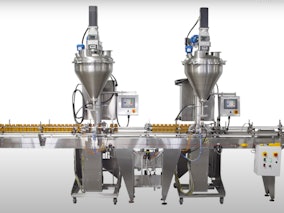
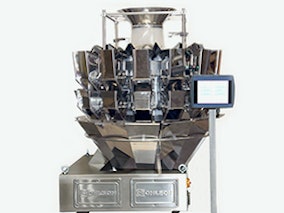
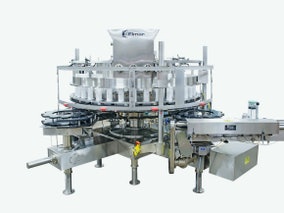
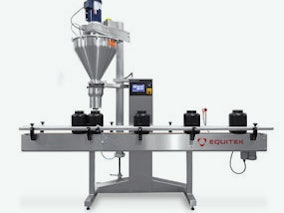
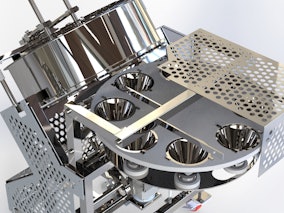
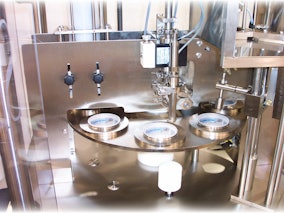
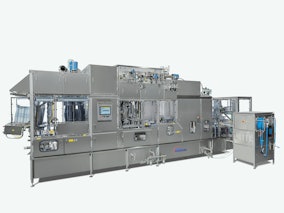
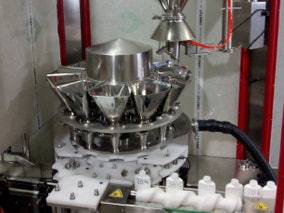
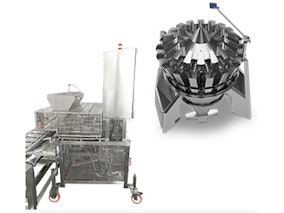
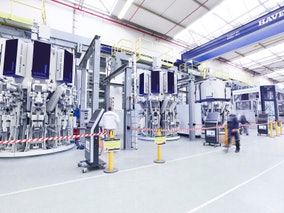
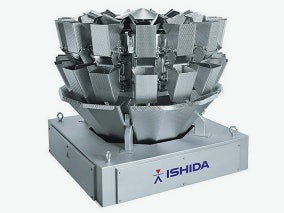
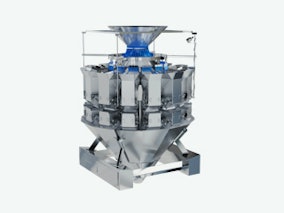

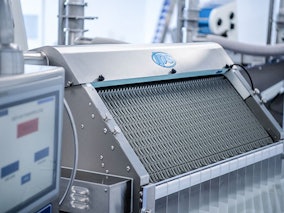
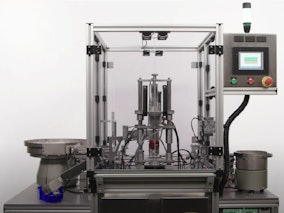
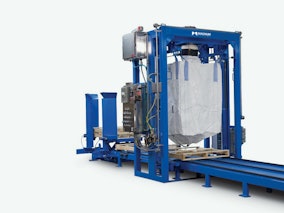
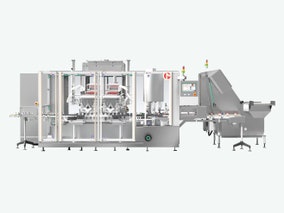
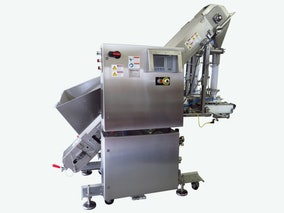
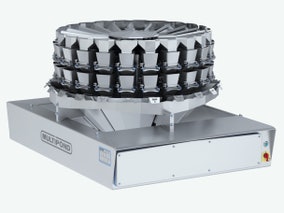
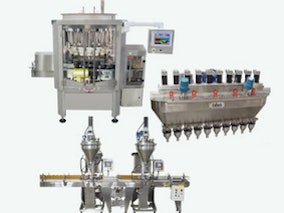
%20-%20Dry%20Fillers.jpg?ixlib=js-3.5.1&auto=format%2Ccompress&q=70&w=284&h=213&fit=crop)
